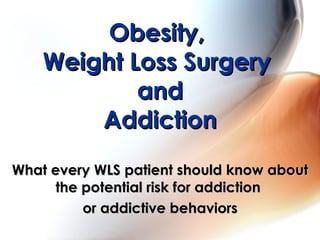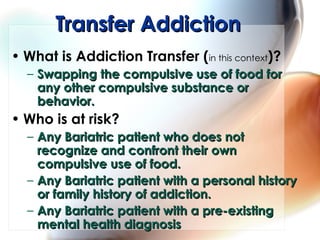Obesity, Weight Loss Surgery and Addiction
- 1. Obesity, Weight Loss Surgery and Addiction What every WLS patient should know about the potential risk for addiction or addictive behaviors
- 2. Presented By: Julia M. Dostal, PhD Executive Director LEAF Council on Alcoholism and Addiction Oneonta, NY
- 3. Why talk about Addiction? WLS patients need to be aware of ALL risks that could be associated with their surgery Addiction impacts 1 of 12 adults in the U.S. Knowing more about medical conditions makes WLS patients an informed healthcare consumer Information can assist a WLS patient in making wise behavioral decisions
- 4. CAVEAT: There are currently NO hard data regarding post operative onset or transfer of addiction. The information we have is either from anecdotal evidence or from inferences related to addictions research This presentation is informational and does not take the place of a discussion with your physician.
- 5. What is Addiction? Three Definitions Compulsive physiological and psychological need for a habit-forming substance Persistent compulsive use of a substance known by the user to be harmful A physical or mental dependence on a behavior or substance that a person feels powerless to stop
- 6. Core Concept: Loss of Control When loss of control happens, addiction is present. The Reward Pathway is the key
- 7. Loss of Control Why does the reward pathway exist? To reward us for activities consistent with our survival and that of our species! Consuming Food Drinking Water Procreation Child Rearing
- 8. THE REWARD : Endorphins and Addiction Endorphins are powerful neurotransmitters that carry messages in our brain. Endorphins are associated with sensations of pleasure, comfort, satiety and a sense of well-being. Humans manipulate their endorphins in a variety of ways in order to positively impact their mood.
- 9. THE REWARD: Endorphins and Addiction Any behavior done compulsively in order to manipulate emotions, mitigate emotions, or create a sense of well-being, has the potential to rise to the level of an addiction. Dopamine is a key endorphin when talking about addiction
- 10. Loss of Control Reward Pathway Gone Awry I like it I want it Neuroadaptation happens I NEED IT!! Neuroadaptation is like going to the gym and building your muscles. You lift 5lb weights for a few weeks and then suddenly, 5 pounds feel like nothing. You now need 10lb weights. That’s what happens to your brain. Whatever feels good suddenly needs more to feel the way it used to feel . But, with your brain, once it adapts it is changed forever.
- 11. Loss of Control The reward pathway becomes fooled that the drug of choice is the SAME as food, water, sex, and child rearing. The brain has adapted to the drug of choice. This is why “just say no” doesn’t work. This is why “willpower” is not the issue.
- 12. The Theory Behind the Obesity/Addiction connection: Although many complex factors may be involved in excessive behaviors such as compulsive drug abuse, overeating, and gambling, they are all similar in three ways The Brain is changed Reward circuits are disrupted The behavior eventually becomes involuntary
- 13. Food Addiction The following are symptoms of food addiction: repetitive consumption of food against the individual’s better judgment loss of control and preoccupation with food preoccupation with body weight and image continuation of food-related behaviors in spite of evidence that the behavior is causing harm
- 14. Transfer Addiction What is Addiction Transfer ( in this context )? Swapping the compulsive use of food for any other compulsive substance or behavior. Who is at risk? Any Bariatric patient who does not recognize and confront their own compulsive use of food. Any Bariatric patient with a personal history or family history of addiction. Any Bariatric patient with a pre-existing mental health diagnosis
- 15. Transfer Addiction When am I most at risk ? When the Kudos and the excitement of the initial weight loss die down. During any high stress point after surgery that you would have normally used food as a buffer. When you, as a bypass patient, discover the novelty of the impact of alcohol on your system and decide to “take the risk.”
- 16. Addictions WLS Patients Need to Be Aware of: Prescription Pain Killers Sex/inappropriate relationships Gambling Alcohol and Other Drugs Shopping Risk Taking Exercise Tobacco
- 17. How to Prevent Addiction after WLS Find healthy ways to get your endorphin “fix.” Listen to friends and family if concern is expressed about ANY behavior they may see as excessive. Ensure that any mental health diagnosis is being properly treated and that you are in compliance with treatment.
- 18. How to Prevent Addiction after WLS Develop coping strategies that do not involve “excess.” If a behavior becomes problematic, speak to your doctor or your therapist. Make yourself accountable to friends and family as you moderate a behavior. STAY CONNECTED to your support group!
- 19. What to do if you think you have an addiction: Speak to an addictions professional. The LEAF Council on Alcoholism/Addictions 80 Water Street, Oneonta NY 13820 607-432-0090 Alcohol & Drug Abuse Council of Delaware County 72 Main Street, Delhi NY 13752, 607-746-8300 The National Council Alcoholism and Drug Dependencies - 244 East 58th Street 4th Floor New York, NY 10022Â Phone: 212/269-7797 Â fax: 212/269-7510 email:Â [email_address] Â Â http://www.ncadd.org HOPE LINE: 800/NCA-CALL Â (24-hour Affiliate referral)
- 20. Online Alcohol Screening Tool http://www.alcoholscreening.org/ Online Drug Screening Tool http://www.drugscreening.org/ What to do if you think you have an addiction:



















![What to do if you think you have an addiction: Speak to an addictions professional. The LEAF Council on Alcoholism/Addictions 80 Water Street, Oneonta NY 13820 607-432-0090 Alcohol & Drug Abuse Council of Delaware County 72 Main Street, Delhi NY 13752, 607-746-8300 The National Council Alcoholism and Drug Dependencies - 244 East 58th Street 4th Floor New York, NY 10022Â Phone: 212/269-7797 Â fax: 212/269-7510 email:Â [email_address] Â Â http://www.ncadd.org HOPE LINE: 800/NCA-CALL Â (24-hour Affiliate referral)](https://image.slidesharecdn.com/obesitywlsandaddiction-forprinting-110706171520-phpapp02/85/Obesity-Weight-Loss-Surgery-and-Addiction-19-320.jpg)
